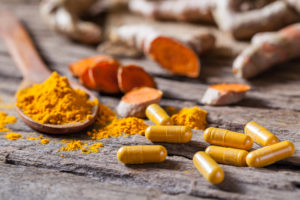The most common symptom women experience in perimenopause and menopause, is hot flashes— day and/or night. They are also called vasomotor symptoms, which are a sudden feeling of heat, burning and/or sweating with a slight increase in body temperature due to increased metabolic rate and vasoconstriction in the periphery. These fluctuating levels of estrogen, and ultimately low levels of peripheral estrogen affect the hypothalamus temperature control center and the central nervous system which eventually alters the levels of neurotransmitter activity including serotonin and norepinephrine, all of which lead to the causing of hot flashes.
Anxiety is also a common issue in perimenopause/menopause although it is complex but can include the loss of self-confidence, the sleep disruption, less activity and mobility, financial stressors and possibly an increase in other chronic illnesses that come with aging.
 A study out of Iran, chose to investigate a combination of curcumin and vitamin E for hot flashes and anxiety in menopausal women. The polyphenols in turmeric and thus the essential turmeric compound curcumin have anti-inflammatory and antioxidant amongst its many mechanisms of action. Vitamin E contains tocopherols also with antioxidant activity. Oxidative stress can be induced by menopause and thus a resulting imbalance between free radicals and antioxidants. While perhaps not a strong choice to investigate for hot flashes and anxiety, this triple blind randomized controlled trial enrolled women ages 40-60 y.o. who were less than 6 years postmenopausal and had hot flashes at least twice per week. Participants were divided into three groups with one group receiving a curcumin capsule of 500 mg twice daily for eight weeks. A second intervention group received oral vitamin E 200 IU twice a day for eight weeks. The third group received placebo twice daily for eight weeks.
A study out of Iran, chose to investigate a combination of curcumin and vitamin E for hot flashes and anxiety in menopausal women. The polyphenols in turmeric and thus the essential turmeric compound curcumin have anti-inflammatory and antioxidant amongst its many mechanisms of action. Vitamin E contains tocopherols also with antioxidant activity. Oxidative stress can be induced by menopause and thus a resulting imbalance between free radicals and antioxidants. While perhaps not a strong choice to investigate for hot flashes and anxiety, this triple blind randomized controlled trial enrolled women ages 40-60 y.o. who were less than 6 years postmenopausal and had hot flashes at least twice per week. Participants were divided into three groups with one group receiving a curcumin capsule of 500 mg twice daily for eight weeks. A second intervention group received oral vitamin E 200 IU twice a day for eight weeks. The third group received placebo twice daily for eight weeks.
Out of 320 menopausal women who were questioned, 160 women entered the study and 93 women chose to participate. Each group had 31 women in it to start. Women completed the hot flash questionnaire one week before starting the intervention and again at 4 and 8 weeks. They also filled out an Anxiety Scale form, and the Female Sexual Function Index (FSFI), and the Greene Climacteric Scale.
The average number of hot flashes in the curcumin group and vitamin E group was significantly lower than the placebo group after the 8 weeks. The first significant difference appeared in the curcumin group after 4 weeks. There was no effect of vitamin E on hot flashes compared with placebo after 4 weeks, but was observed at the end of 8 weeks. This study seemed to report just number of hot flashes, not severity. There was no difference in anxiety, sexual dysfunction or other menopause symptoms between curcumin, vitamin E and placebo.
Commentary: Older research on vitamin E is mixed, and I’ve never included it as a robust option for vasomotor symptoms. Curcumin is an interesting choice as there is some PMS and depression research showing efficacy for mood and effects on serotonin. Since serotonin alterations do have a role in vasomotor symptoms, it seems like it is a possible therapy to pursue. Certainly curcumin has a long list of other conditions that are relevant to aging women including osteoarthritis, insulin resistance and aging vascular endothelial function relevant to cardiovascular disease. By and large, I will think of curcumin and vitamin E for other conditions other than vasomotor symptoms, although menopause is fraught with a laundry list of symptoms including vasomotor symptoms, depression, arthralgias and weight gain. Curcumin in particular would be a logical choice when a woman has multiple symptoms and maybe not just vasomotor symptoms. But again, based on the results of this one study, curcumin could be considered an option for treating the pesky number of hot flashes and night sweats.
Reference: Ataei-Almanghadim K, Farshbaf-Khalili A, Ostadrahimi A, et al. The effect of oral capsule of curcumin and vitamin E on the hot flashes and anxiety in postmenopausal women: A triple blind randomised controlled trial. Complementary Therapies in Medicine 2020; 48:102267

